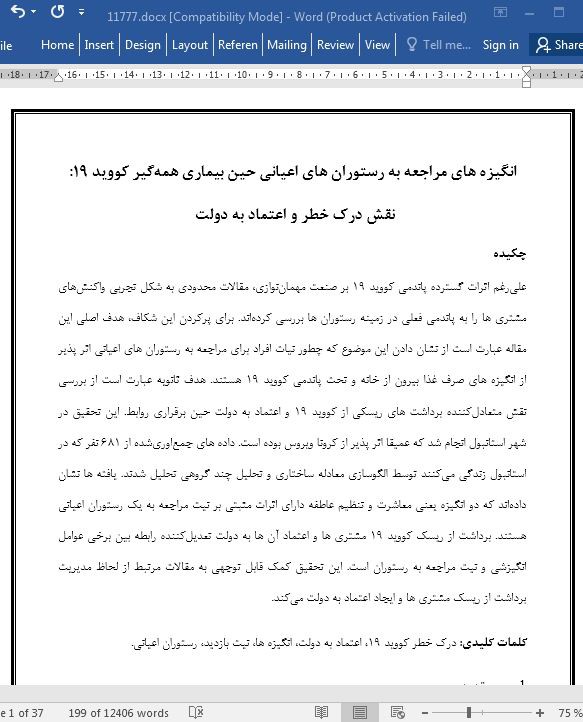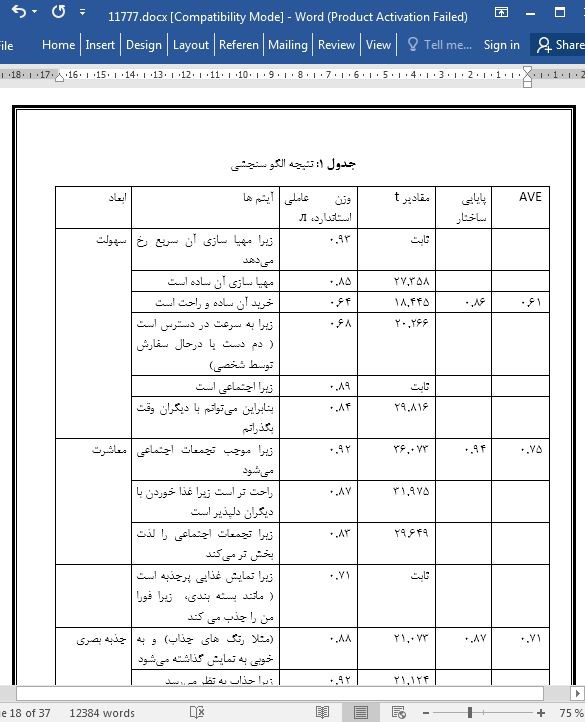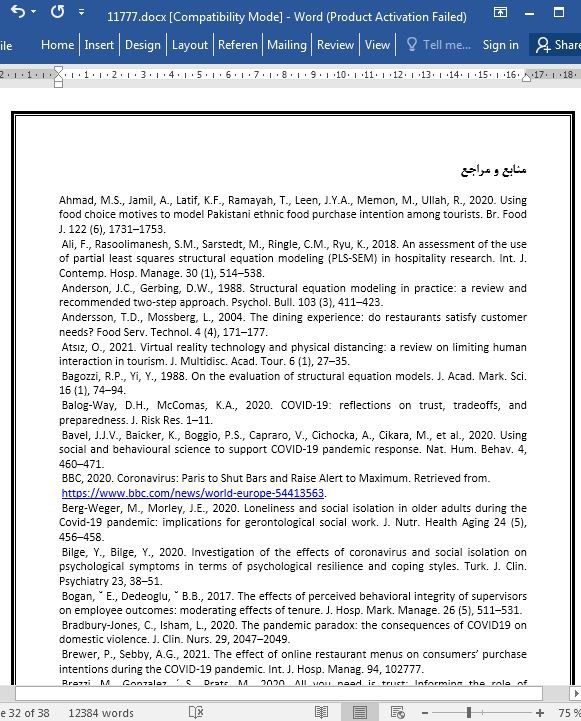
انگیزه های مراجعه به رستوران های اعیانی حین بیماری همهگیر کووید 19
چکیده
علیرغم اثرات گسترده پاندمی کووید 19 بر صنعت مهماننوازی، مقالات محدودی به شکل تجربی واکنشهای مشتری ها را به پاندمی فعلی در زمینه رستوران ها بررسی کردهاند. برای پرکردن این شکاف، هدف اصلی این مقاله عبارت است از نشان دادن این موضوع که چطور نیات افراد برای مراجعه به رستوران های اعیانی اثر پذیر از انگیزه های صرف غذا بیرون از خانه و تحت پاندمی کووید 19 هستند. هدف ثانویه عبارت است از بررسی نقش متعادلکننده برداشت های ریسکی از کووید 19 و اعتماد به دولت حین برقراری روابط. این تحقیق در شهر استانبول انجام شد که عمیقا اثر پذیر از کرونا ویروس بوده است. داده های جمعاوریشده از 681 نفر که در استانبول زندگی میکنند توسط الگوسازی معادله ساختاری و تحلیل چند گروهی تحلیل شدند. یافته ها نشان دادهاند که دو انگیزه یعنی معاشرت و تنظیم عاطفه دارای اثرات مثبتی بر نیت مراجعه به یک رستوران اعیانی هستند. برداشت از ریسک کووید 19 مشتری ها و اعتماد آن ها به دولت تعدیلکننده رابطه بین برخی عوامل انگیزشی و نیت مراجعه به رستوران است. این تحقیق کمک قابل توجهی به مقالات مرتبط از لحاظ مدیریت برداشت از ریسک مشتری ها و ایجاد اعتماد به دولت میکند.
1. مقدمه
بعد از ظهور در ووهان چین در دسامبر 2019، شیوع کروناویروس جدید (کووید 19) به سرعت تبدیل به یک بیماری همهگیر شد و توسط سازمان جهانی بهداشت در تاریخ 11 مارس 2020 رسما وجود آن اعلام شد (سازمان جهانی بهداشت، 2020a). کانون شیوع از چین به اروپا تغییریافت و سپس از اروپا به آمریکا منتقل شد. در تاریخ 13 فوریه 2021، بیش از 100 میلیون نفردر سطح دنیا اثر پذیر از ویروس بودهاند که این خود منجر به تعداد دو میلیون مرگ شده است. کشور هایی که اخیرا بیشترین میزان موارد را ثبت کردهاند عبارت هستند ازآمریکا، هند، برزیل، روسیه و بریتانیا. کشور های اخیرا لیست شده به عنوان تجربه کننده بیشترین میزان مرگ و میرعبارت هستند از آمریکا، برزیل، مکزیک، هند و بریتانیا (پایگاه تحلیلی Worldometer، 2021).
6. محدودیت ها و جهت گیری های تحقیقاتی بیشتر
یکی از بزرگترین محدودیت های به کارگرفته شده توسط این تحقیق این است که داده های تحقیقاتی فقط در زمینه استانبول ترکیه جمعاوری شدهاند. هرچند استانبول شهر شماره یکی است که شیوع بیماری در آن تجربه شده است، مقایسه یافته ها در زمینه دیگرشهر ها که درآن ها تعداد موارد آن قدر زیاد نیست، میتواند نتائج مهمی را موجب شود. ادراک ریسک مشتری ها ممکن است در شهر های با تعداد کمتر موارد ابتلا ممکن است متفاوت باشد. یک محدودیت مهم دیگر در این تحقیق این است فقط تعداد شش بعد درون برد انگیزه های بیرون از خانه غذا خوردن مشتری ها تحلیل شدند. در تحقیقات آتی، عواملی چون قیمت، جشن و رفاه ذهنی میتوانند در الگو تحقیقاتی شامل شوند و در نتیجه مسیر را برای حصول نتائج جامع بیشتر هموار کنند. یک محدودیت دیگر این است که هیچ متغییر کنترلی حین تست الگو استفاده نشده است. عواملی چون سن، ساختار اعضا خانواده، شرایط بهداشتی پایه، سطح درآمد و نوع شغل ممکن است اثرگذار بر نیت مشتری ها برای بیرون از خانه غذاخوردن حین دوره پاندمی باشند. در تحقیقات آتی، اثرات تعدیل کننده این عوامل برالگو قابل تست کردن هستند.
Abstract
Despite the massive impacts of COVID-19 pandemic on hospitality industry, only limited papers empirically examined consumer reactions to current pandemic in the context of restaurants. To fill this gap, the primary aim of this paper is to reveal how individuals’ intentions to visiting upscale restaurants are affected by dining out motivations under the COVID-19 pandemic. The second aim is to investigate the moderating role of risk perceptions of COVID-19 and trust in government in building relationships. The research was conducted in Istanbul, a city deeply affected by the coronavirus. Data gathered from 681 people living Istanbul were analyzed via structural equation modeling and multi-group analysis. Findings indicated that two motivations—namely, sociability and affect regulation—have positive impacts on visit intention toward an upscale restaurant. Consumers’ COVID-19 risk perception and their trust in government moderate the relationship between some motivational factors and visit intention. The study makes a significant contribution to the literature in terms of both managing the risk perceptions of consumers and building trust in government.
1. Introduction
After emerging in Wuhan, China in December 2019, the outbreak of the novel coronavirus (COVID-19) quickly turned into a pandemic, and was officially declared as such by the World Health Organization on March 11, 2020 (WHO, 2020a). The epicenter of the outbreak shifted from China to Europe, then from Europe to America. As of February 13, 2021, over 100 million people worldwide have been infected with the virus, resulting in over two million deaths. The countries currently listed as having the highest number of cases are the United States, India, Brazil, Russia, and UK. The countries currently listed as having the highest number of deaths are United States, Brazil, Mexico, India, and UK (Worldometer, 2021).
6. Limitations and further research directions
One of the greatest limitations employed by the current study is that the research data were only collected in the context of Istanbul, Turkey. Although Istanbul is the number one province where the outbreak has been experienced, comparing the findings in the context of other provinces where the number of cases is not so intense could yield important results. Consumers’ risk perceptions may differ in provinces with lower numbers of cases. The other important limitation in the study is that only six dimensions were analyzed within the scope of consumer dining out motivations. In future research, factors such as price, celebration, and subjective well-being can be included in the research model, thus paving the way for acquiring more comprehensive results. Another limitation is that no control variable was used while testing the model. Factors such as age, family members’ composition, underlying health condition, income level, and type of job may affect consumers’ intention to dine out during the pandemic period. In future research, the moderating effects of these factors on the model could be tested.
چکیده
1. مقدمه
2. مرور مقالات و توسعه فرضیه
2.1 انگیزه های غذا خوردن در بیرون از خانه و نیت مراجعه به رستوران اعیانی
2.2 نقش تعدیل کننده برداشت از ریسک کووید 19
2.3 نقش متعادل کننده اعتماد دردولت
3. روش شناسی
3.1 ابزار
3.2 جمع آوری داده ها و نمونه گیری
3.3 تحلیل داده ها
4. یافته ها
4.1 یافته های جمعیت شناختی
4.2 الگو ساختاری
4.3 اثر تعدیل کننده برداشت از ریسک
4.4 اثرتعدیل کننده اعتماد به دولت
5. مبحث و مفاهیم
6. محدودیت ها و جهت گیری های تحقیقاتی بیشتر
7. ضمیمه A، داده های تکمیلی
منابع و مراجع
Abstract
Keywords
1. Introduction
2. Literature review and hypothesis development
2.1. Dining out motivations and visit intention to upscale restaurant
2.2. Moderating role of COVID-19 risk perception
2.3. Moderating role of trust in government
3. Methodology
3.1. Instrument
3.3. Data analysis
4. Findings
4.1. Demographic findings
4.2. Structural model
4.3. Moderating effect of risk perception
4.4. Moderating effect of trust in government
5. Discussion and implications
6. Limitations and further research directions
Appendix A. Supplementary data
References
- اصل مقاله انگلیسی با فرمت ورد (word) با قابلیت ویرایش
- ترجمه فارسی مقاله با فرمت ورد (word) با قابلیت ویرایش، بدون آرم سایت ای ترجمه
- ترجمه فارسی مقاله با فرمت pdf، بدون آرم سایت ای ترجمه



